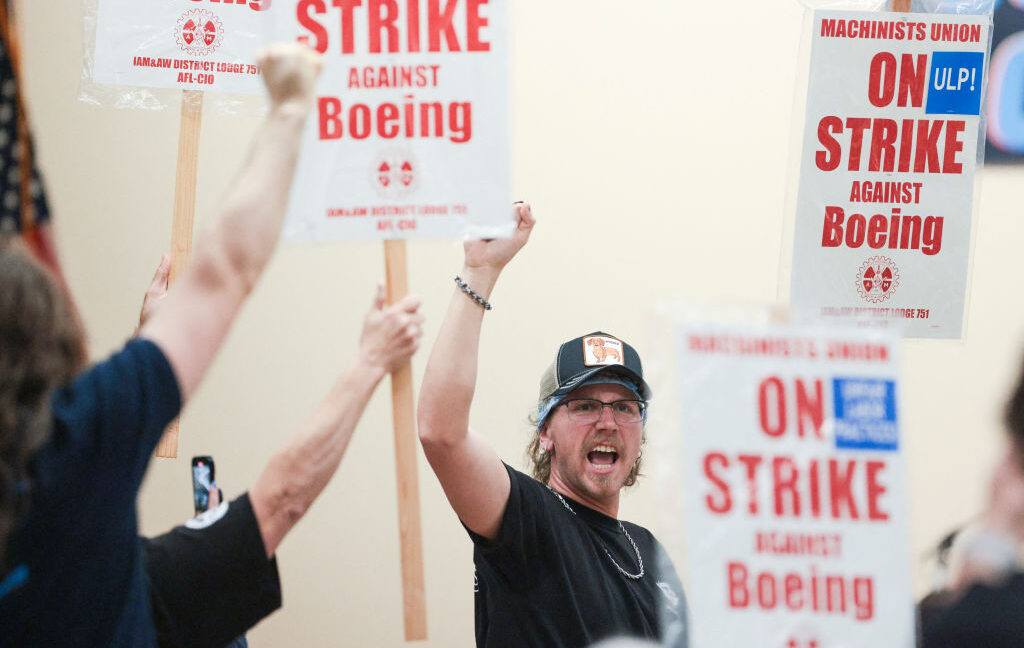Boeing Strike Ends as Workers Accept “Life-Changing” Wage Increase
In a significant turn of events, more than 33,000 Boeing workers have reached a tentative agreement to end a weeks-long strike that has cost the U.S. economy over $9.6 billion. The strike, which involved members of the International Association of Machinists and Aerospace Workers (IAM) Districts 751 and W24, concluded after workers voted in favor of a deal that promises substantial wage increases and improved benefits.
The Settlement Details
The new agreement will provide workers with a 43% wage increase over the next four years, alongside a $12,000 bonus that can be received as part of their paycheck, a contribution to their 401(k), or a combination of both. Boeing will also match 401(k) contributions up to 8%. According to The New York Times, this deal will elevate the average annual pay of machinists to over $119,000 by the end of the contract, up from nearly $76,000 today.
IAM’s press release described the agreement as “life-changing” for Boeing workers, emphasizing the significance of these wage increases. Workers had previously rejected Boeing’s “best offer” of a 25% wage increase in September, standing firm in their demands for fair compensation despite the financial toll of the strike on both sides.
The Role of Labor Negotiations
Negotiations had stalled until U.S. Secretary of Labor Julie Su intervened, helping to facilitate discussions that led to the current agreement. IAM District 751 President Jon Holden highlighted the importance of worker solidarity in achieving these negotiations, stating that the strike was a stand against corporate overreach and a fight for fair compensation for the critical work performed by the employees.
“Our members perform high-quality and flight-critical work for the airplanes we build and deserve a return on their labor investment that provides for the quality of life worthy of that labor,” Holden said.
Boeing’s Response and Future Outlook
In response to the agreement, Boeing President and CEO Kelly Ortberg expressed satisfaction at reaching a ratified deal. He emphasized the need for collaboration as the company moves forward, stating, “While the past few months have been difficult for all of us, we are all part of the same team.” Ortberg, who joined Boeing shortly before the strike began, aims to restore production, particularly of the new 737 models, and rebuild the company’s reputation.
Commitment to Quality and Safety
Beyond wage increases, workers secured improvements in various areas, including better short-term and long-term disability plans, enhanced healthcare cost containment, improved overtime rules, and essential job security provisions. Holden expressed optimism about the future, stating that workers are ready to help Boeing regain its status as a leader in aviation safety and quality.
“Our members are critical to that mission and now have a stronger voice in the decision-making process to ensure those needed improvements are made,” Holden asserted.
Financial Implications for Boeing
Boeing is expected to incur over $1 billion in higher wages over the contract’s four years, as estimated by Jefferies analyst Sheila Kahyaoglu. The company recently raised $23 billion by selling shares to banks, marking one of the largest capital sales by a public company. Despite the immediate financial burden, the agreement is seen as a necessary step to stabilize Boeing’s operations and workforce.
A Historic Agreement
This groundbreaking agreement is poised to set new standards for compensation and benefits in the aerospace industry. Holden noted that livable wages and benefits are essential for supporting families, and he hopes the outcome of this strike will inspire other workers to organize and advocate for their rights.
“Frontline Boeing workers have used their voices, their collective power, and their solidarity to do what is right, to stand up for what is fair—and to win,” he concluded.
As Boeing workers prepare to return to work, the impact of this agreement will resonate not only within the company but across the entire labor landscape, signaling a pivotal moment in the ongoing fight for workers’ rights and fair compensation.
Thank you for taking the time to read this article! Your thoughts and feedback are incredibly valuable to me. What do you think about the topics discussed? Please share your insights in the comments section below, as your input helps me create even better content.
I’m also eager to hear your stories! If you have a special experience, a unique story, or interesting anecdotes from your life or surroundings, please send them to me at whatsissue@gmail.com. Your stories could inspire others and add depth to our discussions.
If you enjoyed this post and want to stay updated with more informative and engaging articles, don’t forget to hit the subscribe button! I’m committed to bringing you the latest insights and trends, so stay tuned for upcoming posts.
Wishing you a wonderful day ahead, and I look forward to connecting with you in the comments and reading your stories!
